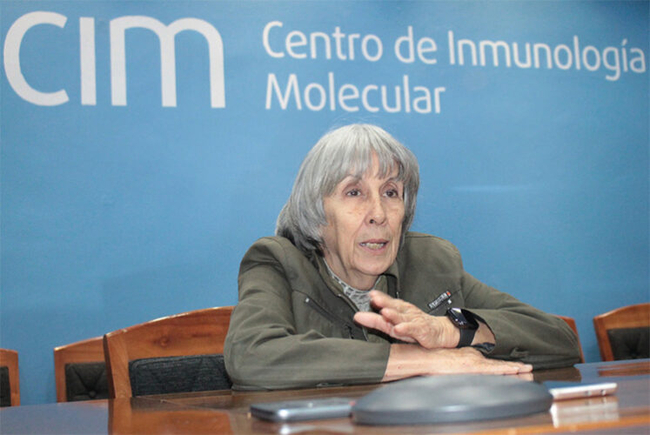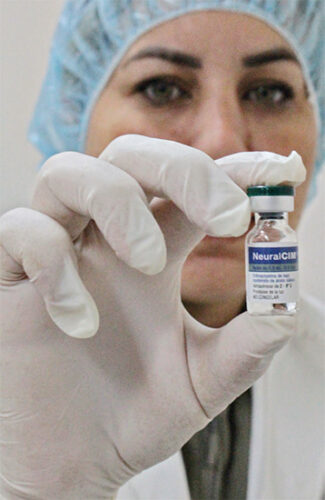Cuba brings hope to Alzheimer’s patients and their families
News from Cuba | Thursday, 15 May 2025

Dr Lauren Collins reports on the positive results coming from new drugs that the world hears little about because they are developed in Cuba
With ageing populations increasingly common around the world, degenerative brain disease is on the increase. Alzheimer’s disease, the most common form of dementia, has a devastating impact on the lives of patients and their families.
Worldwide, the number of people with dementia is expected to reach 82 million in 2030, rising to 152 million in 2050, with most cases among people in low- and middle-income countries.
Currently, there is no universally accessible, adequate, or globally-accepted treatment to inhibit its progression, which makes it one of the biggest public health challenges of the 21st century.
Cuba, which has its own rapidly-ageing population, has given high priority to research associated with degenerative brain diseases, specifically Alzheimer’s. Such research is possible thanks to the commitment to, and investment in, health and education from the start of the Revolution. Prevented from accessing US drugs, it was imperative that Cuba produced homegrown treatments, and this remains the case today.
However, the manufacturing of new drugs is a long and expensive process. First there is the painstaking research and development of a new candidate drug, followed by pre-clinical trials to establish safety and efficacy. Only then can human trials begin, carried out in three phases over a number of years. Cuba faces challenges at every step of this process as a result of the US blockade.
In 1981, Cuba established the Biological Front to develop its biotechnology industry. Since the establishment of the Centre for Genetic Engineering and Biotechnology (CIGB) in 1986, the sector has grown. Today it comprises 34 institutions and 200 engineers and scientists, which make up the biotechnology and pharmaceutical sectors known collectively as BioCubaFarma.
Two research and development institutions under this umbrella have candidate drugs for treating Alzheimer’s disease: the Cuban Centre for Neurosciences (CNEURO) and the Centre of Molecular Immunology (CIM). CNEURO-201 is a molecule developed by CNEURO which targets multiple neural pathways altered during the course of Alzheimer’s disease. Currently, this drug is at the pre-clinical trials stage where tests indicate that the drug potentially halts, or at least significantly delays, the progress of the disease when used by patients in the early stages. CIM has developed NeuroEPO, which works by stimulating red blood cells in the brain and is at a more advanced stage of development.
Just as with the vaccines, Cuban research institutions developed for COVID-19, CNEURO and CIM are not in competition with each other. In fact they often collaborate on research projects, but they approach problems from a different scientific standpoint: CNEURO focuses on neurological conditions and CIM on illnesses arising from immunological problems. These different approaches lead to different types of medication, potentially increasing the chance of success.
NeuroEPO was first developed to treat several brain diseases such as Parkinson’s, strokes and ataxia. However, CIM scientist Dr Teresita Rodríguez Obaya realised that it might help Alzheimer’s sufferers, and she was proved correct after using it to treat her own mother and noticed an improvement in her symptoms. This led to clinical trials in Alzheimer’s patients.
The drug is a form of the naturally produced erythropoietin protein (EPO), which stops neuron cells from dying, promoting their growth and communication mechanisms. During Phase 2 clinical trials NeuroEPO was shown to improve cognitive decline in patients with mild to moderate disease, and it is now undergoing Phase 3 clinical trials.
This story is the subject of a forthcoming documentary by Belly of the Beast, the media collective of Cuban and US-based journalists and filmmakers whose work hashighlighted the impact of the blockade, Cuba’s medical internationalism and the stories rarely told by the mainstream media, especially in the US.
Teresita’s Dream: Cuba’s Battle against Alzheimer’s features Dr Obaya who has worked in Cuba’s biotechnology sector since its inception in the 1980s, was a founder of CIM, and now heads the team working on NeuroEPO. The documentary explains how US sanctions hinder research and development and prevent Cuban treatments from reaching the rest of the world. Margarita, one of the patients who took part in the Phase 2 clinical trials, is interviewed with her husband and daughter about her progress.
Although the film has not been released yet, I was lucky enough to see a preview screening while in Havana in February. The distress that this terrible disease causes both patients and their families is captured through Teresita’s memories of her own mother, and the joy and relief of Margarita and her family that hope is on the horizon. The visible enthusiasm of clinical staff involved in the trials points to the significance of NeuroEPO. The cinematography accurately renders the details of everyday life in Cuba, and the musical score responds to the viewers’ emotions as they watch: a blend of poignancy and of pride in what has been achieved under such difficult conditions.
UK film premiere and Q&A with director
Teresita’s Dream: Cuba’s Battle against Alzheimer’s
Saturday 14 June, 2.30pm, London
The new Belly of the Beast film will receive its UK premiere following the CSC AGM in June. After the screening there will be a discussion and Q&A with the director and producer Daniel Montero.
(Article from CubaSi Spring 2025. Join CSC to receive the magazine 4 times a year)

Dr Teresita Rodriguez

Tests indicate that CNEURO-201 may delay or halt the progress of Alzheimer’s






